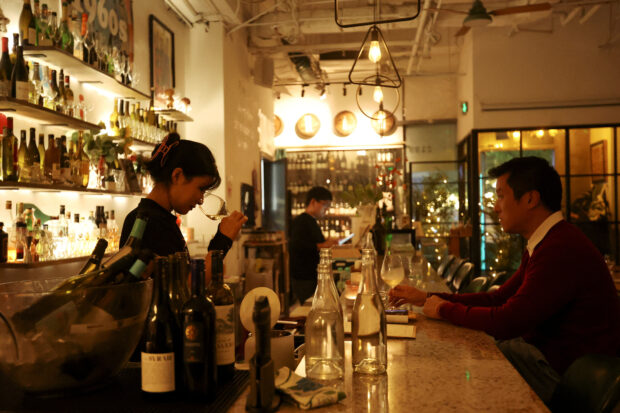
A staff member sniffs wine in a glass while a customer watches at the Trio Wine Bar in Beijing, China Nov 1, 2023. REUTERS/Florence Lo/File photo
BEIJING -China said on Thursday it would review the need for anti-dumping and anti-subsidy tariffs on Australian wine imports, a highly anticipated move that is part of a push to improve the relationship between the two countries.
The Commerce Ministry said in a statement it had decided to conduct the review from Thursday.
Last month, China and Australia said they had reached a consensus to settle a World Trade Organization dispute about wine, and that the anti-dumping tariffs, set to expire in 2026, would be reviewed.
“The Ministry of Commerce will carry out a review in accordance with the law to fully protect the rights of all stakeholders,” Shu Jueting, a commerce ministry spokesperson, told a regular news conference in Beijing.
READ: China’s wine market ready to welcome return of Aussie wine as ties improve
“We will adjudicate objectively, fairly and openly based on the claims of each interested party and after examining the evidence,” she added.
The ministry said any interested parties or stakeholders may submit comments in writing within 20 days.
The introduction by China of a 218-percent tax on most Australian wine in 2021 prompted trade, previously valued as high as $1.2 billion annually, to collapse.
“This is good news for the thousands of Australians who work in the wine industry,” a spokesperson from the Australian Trade Minister’s Office said.
Since the expedited removal of duties on Australian barley, the government has engaged actively with China to secure a similar process to resolve the dispute on wine, the spokesperson added.
READ: China to lift tariffs on Australian barley after 3 years
Australian Prime Minister Anthony Albanese has sought to improve ties with major trade partner China which had deteriorated over several years due to disputes over Chinese telecoms firm Huawei, espionage and COVID-19.
Albanese became the first sitting Australia leader to visit China since 2016 when he travelled to Beijing in early November.